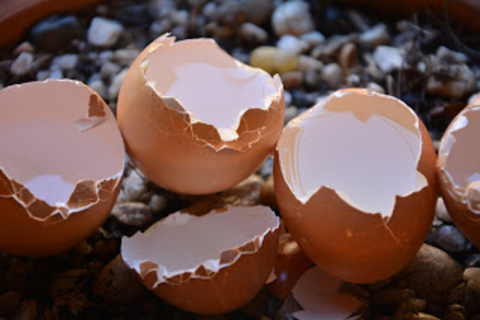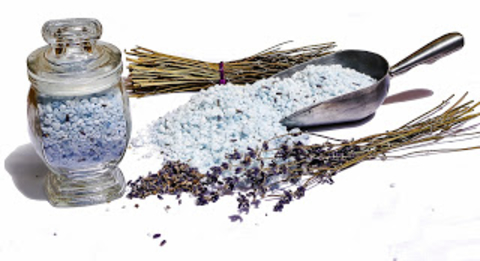Quick facts
-
Coffee grounds contain compounds that feed healthy soil but they don't lower pH.
-
Eggshells do not prevent blossom end rot. They add organic material for soil organisms, but you may as well just put them in the compost.
-
Epsom salts can be harmful to soil, plants and water.
Every once in a while, it's good to take a step back and think about what we add to our gardens and why. Some things we add are helpful, some are neutral, and some can even be harmful to your soil or plants. Three common soil health "remedies" may or may not be helpful in the garden.
Remedy #1: Used coffee grounds to lower soil pH
Coffee grounds can be beneficial to your soil. However, they have not been shown to consistently lower soil pH. Cultivating a robust and diverse population of soil microbes is the foundation for healthy soil and healthy plants. Soil organisms then transform these nutrients into chemicals that plants use for growth.
- Coffee grounds contain carbon, nitrogen and other compounds that feed soil organisms.
- Coffee grounds can contain compounds that help suppress some plant disease-causing microbes.
- Coffee grounds make an excellent addition to compost.
If you want to lower your soil's pH, elemental sulfur is a good option. Other options for lowering soil pH may include iron sulfate or aluminum sulfate, but they are more expensive than elemental sulfur and aluminum is toxic to nearly all but the most acid-loving plants.
For best results, do a soil test prior to establishing any perennial plantings that need a lower pH (such as blueberries) because some soils may be too alkaline or have chemical characteristics that make it difficult to effectively lower pH.
Verdict:
Modest amounts of coffee grounds in the garden can be beneficial, but not for lowering soil pH.
Remedy #2: Crushed eggshells to prevent blossom end rot in tomatoes
The idea here is that blossom end rot is caused by a calcium deficiency, so adding calcium-rich eggshells to the soil could provide calcium to your tomatoes (or other plants that suffer from blossom end rot).
It's true that blossom end rot is a sign of calcium deficiency in fruits (tomatoes, peppers, zucchini, etc). But most Minnesota soils already have plenty of calcium for garden plants. This kind of calcium deficiency is not a result of inadequate calcium in the soil, but rather a signal that there's a water transport issue in your plants.
- Calcium enters plants only through the actively growing root tips.
- Calcium moves through the plant and into the fruits along with water, via transpiration.
- Damage to roots or problems with water uptake and movement in the plant can limit the amount of calcium reaching the fruit.
Sometimes, a great abundance of other nutrients in the soil (such as magnesium or ammonium) can also interfere with calcium uptake.
How to prevent blossom end rot:
- Keep the soil evenly moist by providing adequate water (but not too much) and mulching around plants.
- Protect your plant's roots. Don't cultivate too close to the base of the plant.
- Do a soil test and add fertilizer according to recommendations and fertilizer label instructions.
Read more about preventing blossom end rot.
And finally, if you've added eggshells to your compost, you know that they don't decompose very quickly. It's no different if you add eggshells directly to your garden soil. Even if you did need the calcium in your soil, eggshells generally decompose too slowly to be effective. However, the smaller the pieces are, the faster they'll decompose.
Agricultural lime and gypsum are good sources of calcium, but do a soil test before applying.
Verdict:
Eggshells do not prevent blossom end rot. The good news is that they won't harm your soil or plants and they add organic material for soil organisms, but you may as well just put them in the compost.
Remedy #3: Epsom salts to prevent blossom end rot and make peppers and tomatoes more productive
Wouldn't that be nice? Sadly, it's not true.
Epsom salts contain magnesium sulfate (MgSO4) and are touted as a common garden cure-all. However, after reading Remedy #2, you now know that blossom end rot is caused by a calcium deficiency and not a magnesium or sulfur deficiency. So, Epsom salts will not prevent blossom end rot.
In fact, adding too much magnesium to your soil can actually prevent adequate calcium from getting into your plants, making blossom end rot even worse.
As for increased productivity, there's no evidence to indicate that this is so unless your soil is deficient in magnesium. Epsom salts can be a good source of magnesium, but only use them if a soil test indicates that you have a magnesium deficiency.
- Magnesium deficiencies in the home garden in Minnesota are most likely to occur on sandy, low pH soils.
- Adding Epsom salts to soil that already has sufficient magnesium can actually harm your soil and plants, such as by inhibiting calcium uptake.
- Spraying Epsom salt solutions on plant leaves can cause leaf scorch.
- Excess magnesium can increase mineral contamination in water that percolates through soil.
The best practice is to avoid adding any extra chemicals to your soil - even things that seem 'safe' - because you can easily do more harm than good.
Verdict:
Unless you have a magnesium deficiency in your garden, there is no need to add Epsom salts. Doing so could even be harmful to soil, plants and water.
Find out more about healthy soil and getting a soil test.
Chalker-Scott, L., 2007. Miracle, myth... or marketing: Epsom salts. https://s3.wp.wsu.edu/uploads/sites/403/2015/03/epsom-salts.pdf
Chalker-Scott, L., 2009. Miracle, myth... or marketing: Coffee grounds - will they perk up plants? https://s3.wp.wsu.edu/uploads/sites/403/2015/03/coffee-grounds.pdf
Combs, S., 2007. Reducing Soil pH. https://hort.extension.wisc.edu/articles/reducing-soil-ph/
Reviewed in 2024



